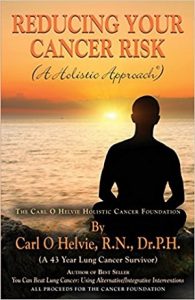Reducing Your Cancer Risk: A holistic approach
 Guest post by Carl O Helvie, R.N., Dr.P.H.
Guest post by Carl O Helvie, R.N., Dr.P.H.
Did you know that the current risk of cancer is 1 of every 2 people in the United States? And did you know that 40% of these are preventable according to research. Thus, it is important to learn how to reduce your cancer risk to avoid being in a cancer or cancer survivor group. .
What areas of life offer an opportunity to reduce your cancer risk. . The author uses a public health framework to answer this question. Assuming health and illnesses (cancer) are processes resulting from the interaction of the human host, a disease or disabling agent, and the environment, disease can occur when the host is weak, the agent is strong, and the environment that brings them together is favorable. Thus, it is important to avoid or reduce environmental carcinogens, to strengthen the host, and to make the environment less favorable for an interaction. Intervening before the host interacts with an agent in a favorable environment is known as prevention and is most cost effective and less traumatic for individuals.
There are four major areas of environmental carcinogens that can be avoided or reduced in intensity. These include electromagnetic frequencies (EMF), ultraviolet rays, carcinogenic chemicals, and carcinogenic metals. The author discusses research related to each area as it relates to cancer and ways to avoid them. There are also over 45 national expert interviews linked to appropriate topics throughout the book. For example, Bisphenol A (BPA) a carcinogenic chemical, is an endocrine disrupter responsible for cancers of the prostate and breast. It is found in plastic and you can avoid it by replacing plastic water bottle in which the plastic leaches into the water during hot weather or transporting with glass containers, replace plastic utensils, and not eating canned foods that havw BPA linings in the can.
There are many things you can do to build your bodies immunity against carcinogens. Some physical interventions include working with nutrition, fluids, exercise, adding supplements and herbs, using immune builders, getting adequate rest and sleep, and avoiding or stopping smoking. For example, research shows that daily exercise reduces your risk of cancer by 50% and proper nutrition reduces it by 35%. Looking at nutrition, the Standard American Diet (SAD) of high animal protein and fat, saturated fats and cholesterol, high sugar and processed foods, and low complex carbohydrates and vegetables with GMO, pesticides, and other pollutants is considered a potential causal factor for cancer and should be replaced with a diet with more fruit and vegetables especially raw ones and lesser amounts of nuts and proteins. Researchers are finding that the vegan diet lends itself to reducing several diseases including cancer. A proper diet should also include organic, non-GMO food without growth hormones, pesticides and other pollutants. Good sources of oil should be used such as cold pressed organic olive oil for low or no temp cooking, and coconut oil for high temp cooking. Anti- inflammatory foods and anti oxidants should also be included. Also avoid farm grown fish and seafood, large fish that eat smaller ones and have higher mercury levels and avoid foods that raise the glycemic level in the body. Some physicians believe eliminating inflammation will reduce most diseases and taking anti-inflammatories canl help overcome them. Antioxidants are important because the cells give off waste including free radicals that lead to inflammation and are precursors to disease. The body produces some antioxidants to balance the free radicals but with radiation, processed foods and other contaminants this process cannot keep up so additional ones in food are necessary. .
A last area of interventions to reduce cancer risk are mental/spiritual ones such as prayer, meditation, affirmations, visualization, faith, helping others, compassion, gratitude and others. These were important in my cancer journey with lung cancer 43 years ago when I was given 6 months to live and was offered chemotherapy and surgery which I refused. Instead I used a holistic natural approach.
Although there is no research to support mental/spiritual interventions killing cancer cells there is currently adequate research to show the supplemental role they play. Overall these include reduce blood pressure, heart and breathing rates, improve memory. Increase DHEA, a hormone that reduces aging and decreases cortisol, the stress hormone, by 23%, increase happiness and self esteem, improve immune functioning. Improve tolerance to aches and pains, reduces stress, improves quality of life and others. Specifically. Cancer patients with a sense of purpose have an increased life spam, and those who are spiritual have less pain and a higher quality of life,. Patients who meditate have 31% lower stress symptoms, and 67% less mood disturbances, and music can lower patient’s anxiety, pain, heart rate, breathing rate and blood pressure. Visualization can improve immune functioning in cancer patients. .More information at: www.HolisticCancerFoundation.com
Carl O Helvie, R.N., Dr.P.H. is a nurse with a doctorate in public health and over 60 years’ experience as a nurse practitioner, educator, author and researcher. He had published 9 books and chapters in 4 additional ones and over 100 international research papers and articles. He has been listed in most national references and Wikipedia. At age 85 he continues hosting the Holistic Health Radio Show, and serving as President of the Carl O Helvie Holistic Cancer Foundation.









